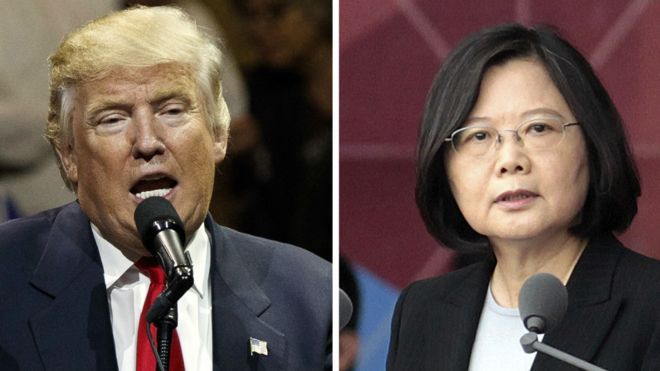Donald Trump showed the challenge to Sino-US relations posed by changing of US president. He talked with Taiwan’s Tsai Ing-wen over the phone and later tweeted about it, in a way of trying to justify what he has done. His imprudent act arguably broke the US policy that has been there ever since China and the US established diplomatic relationship in 1979, raising concern not only in China but also in his own country. The White House reaffirmed US “One China” policy in the wake of the phone call, and people warned that his act would have negative impact on America’s relations with China.

The Taiwan issue has always been a critical and sensitive one between China and the US. It is about China’s core national interest and as many in China see it, America should definitely be held responsible for the problem we have been facing for decades. Any positive development in, or simply maintaining the stability of, the Sino-US relations must be based on the fact that the US behavior is not worsening the situation over Taiwan. For America to exasperate China, Taiwan is always the most effective tool.
Since Trump’s victory in the presidential election on Nov. 8, there has been a lot of talk and guessing about his future presidency, and when it comes to his foreign policy, “unpredictable” is probably the word mostly frequently used to describe it. So far, people still don’t have much idea about the policies he’s going to pursue, and at this time, it’s hard to figure out the whole picture of his international strategy. During the campaign and after the election, Trump has been sending signals that sometimes confuse different audiences. His recent remarks about America withdrawing from TPP upset the Japanese a lot and made some in China believe that there are opportunities awaiting in the Trump era, while his phone call with Tsai must have depressed those who felt optimistic.
In the history of new US presidents coming into office, there were precedents that they touched the “red line” on Taiwan issue. We still remember that Ronald Reagan and George W. Bush were seen as quite pro-Taiwan in the first months of their presidency. Coincidentally, both had a Democratic predecessor, as Trump does. And in both cases, it turned out that China just didn’t cave in, it was the US side that changed its original positions, bringing the bilateral relationship back to track. Today’s relationship between China and the US is a very different one from what it was in the years of 1981 and 2001, when Reagan and George W. Bush took office respectively. Much more is at stake now, not only for the two giant countries but also for the Asia-Pacific region and the whole world. Without effective cooperation between the two, on many critical issues — from those Trump doesn’t care about very much, like climate change, to those he really cares about, like economy and trade— necessary improvements just cannot be made. And if China and America go into a downward spiral, many countries would be negatively influenced in one way or another. That means a US president, no matter how he personally sees China, needs to pay close attention to the bilateral relations and keep in mind that it costs the US much more than before if things are not going okay. Of course, that is also true on the Chinese side.
There are different ways to explain why Trump decided to take this phone call with Tsai. It could be that, as an outsider in terms of foreign policy, he just doesn’t understand the sensitivity of the issue and the diplomatic protocol related, and he was “exploited” by his staff members who wanted him to do something like this. Or, as someone who doesn’t care much about the existing rules, he wants to test a possible policy shift. Or, as the incoming US president, he hoped a show of toughness can give him an upper hand in interactions with China. It is also possible that with a clear calculation, Trump wants to take the advantage of being the president-elect rather than the incumbent, by doing something with kind of ambiguity, to see how China reacts to this, from which he learns about dealing with this complex and very important bilateral relationship.
As the consensus gradually has been building in America on strategy toward China in the past two decades, people have begun to pay less attention to how political changes in the US might influence Sino-US relations. For quite some time, China has not been the outstanding issue in elections it once was. It is widely accepted that any personal feeling of US a president will yield to the substance of the bilateral relations in which America has huge interest. People expect the “learning curve” for a new president’s China policy to be short, and that was exactly the case for Barack Obama. The transition between Obama and his predecessor in terms of US China policy was so smooth that many believed that the old cycle of a new US president always having a rough time with China before things turn better is gone. However, now it seems we are facing a reversal, because in many ways Trump is an exception to all the rules.
We really need to know more about Donald Trump the person. Why he does something and what is his logic behind his words and deeds are important for the outside world to understand Trump and his policy. For Trump, he definitely needs to know more about the world. He still has a lot to learn about policy issues. He needs to understand the subtleties of different policies and the necessary logic behind them. He also needs to understand that just because he is the US president doesn’t mean many of the long-time held policy positions are obsolete. As a matter of fact, policies outlive presidents’ terms because they are in America’s own interests. Trump’s personal style has proved to work well in appealing to voters he needed to get him elected this year. But it will not work that well in appealing to the world when he is in the White House. It will take time for Trump to get used to his new job, and we only hope that before that, not much damage will be done.


